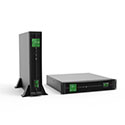Tips to Consider When Purchasing a UPS
 According to statistics, sudden power loss and power surges are two of the main causes for the resultant damages to PCs and other delicate electronics. Albeit uncommon, such events can shut down your PC when you require it the most and can cause thousands of dollars damage to other different gadgets. However, keeping in mind the end goal to protect your PC against power supply intrusions, the best solution to this is not a surge protector, but rather battery reinforcement, suitably named an Uninterrupted Power Supply (UPS). UPS units give support against power supply intrusions running from a couple of minutes to an hour or all the more relying upon the span of the unit. In this article, we highlight vital tips to consider when purchasing a UPS.
According to statistics, sudden power loss and power surges are two of the main causes for the resultant damages to PCs and other delicate electronics. Albeit uncommon, such events can shut down your PC when you require it the most and can cause thousands of dollars damage to other different gadgets. However, keeping in mind the end goal to protect your PC against power supply intrusions, the best solution to this is not a surge protector, but rather battery reinforcement, suitably named an Uninterrupted Power Supply (UPS). UPS units give support against power supply intrusions running from a couple of minutes to an hour or all the more relying upon the span of the unit. In this article, we highlight vital tips to consider when purchasing a UPS.
1. How Much Power Do Your Devices Require?
Before you purchase a UPS, you need to ask yourself how much power the gadgets associated with the UPS will utilize. On the off chance that the equipment you are running require more power than the UPS can produce, they’ll go dead as the UPS will go to a bypass state, regardless of the fact that the battery has a lot of charge. Consider it like a PC’s energy supply; if the wattage is lower than what the PC needs, you’re in a tight spot. Alternatively, you may need to buy UPS systems with a large power storage capacity such as the 100KVA GE LP33 Series Ups (Uninterruptible Power Supply) which also works in a double-conversion mode with genuine consistent online voltage and Frequency Independent (VFI) operation. The LP33 Series UPS by GE Operates at 208V 3 Phase
2. What KVA Size for a UPS System?
The GE LP33 Series UPS is normally sized from 10KVA up to 100KVA at 208V 3 Phase. Thus you’ll have to put a thought into the total pieces of equipment you will be backing up and what number of them is genuinely vital to be supported by the UPS. As a rule, it’s a smart thought to purchase a UPS with the proper KVA capacity you require then upsize by 30% to 50%, as that gives you some flexibility for any future additions. Some reputable UPSs such as the GE LP33 Series UPS give users the flexibility to extend power by paralleling up to four units at a time in a parallel redundant application.
3. To what extent do You Need to Run on Battery?
Since you’ve taken care of the wattage, VA, KVA and KW, you ought to likewise consider the timeline your equipment needs to run during a power outage. A few purchasers buy a UPS in light of the fact that they need a couple of minutes to shut down equipment legitimately and save any work that was in progress. Others need a UPS so they can work through power outages which may keep going for more than 60 minutes. You need to carefully analyze which of the category suits you and buy a UPS that will meet your needs.
4. How long is the Warranty?
A UPS protects electronic equipment worth thousands of dollars. At the point when an item performs such an imperative capacity, you’ll need some genuine feelings of serenity. What’s more, authentic makers give only an equipment protection-warranty. However, while sourcing a UPS from a reputable company such as GE you are assured of a warranty anywhere from 1 to 5 years that includes all parts, labor and travel.
As we conclude, it is important to note that loss of power and power surges are really unpredictable. A little blemish in a transformer’s hardware can bring about a power outage or, at times, a surge sufficiently solid to damage most gadgets in your home. However, quality GE LP33 Series UPS (Uninterruptible Power Supply) https://ge-upssystems.com/lp-33u-series-by-ge/ combines functions of an astounding surge-protector with those of a battery; this functionality keeps your computer and other electronic gadgets running even after a power outage.
That is the principle reason you ought to follow the above tips before making the jump to purchase a UPS.
GE LP33 Series UPS Sizes: 10KVA, 20KVA, 30KVA, 40KVA, 50KVA, 60KVA, 80KVA, 100KVA and 120KVA. All units operate at 208V 3 Phase.






